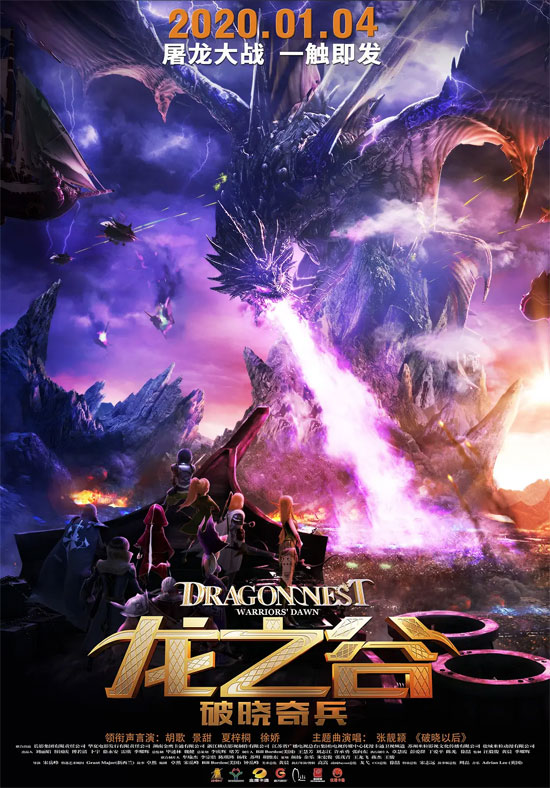Film Name: 龙之谷:破晓奇兵 / Dragon Nest: Warriors’ Dawn / Dragon Nest: Rise of the Black Dragon

The first thing I did after returning from my Phuket vacation was to head to the cinema to see “Dragon Nest,” which had been recommended by many friends. Overall, it felt seamless, the final battle scenes were intense, and the theater was packed, so the atmosphere was electric. However, having never played the game myself, I didn’t feel particularly moved. The film’s large-scale production has completely stripped away any trace of the typical Chinese animation style. Having grown accustomed to the many “cute” elements in domestic animations, this shift felt somewhat unfamiliar to me.
The film’s most compelling moments weren’t actually the grand finale’s hero-versus-dragon spectacle. While the Black Dragon possessed formidable power, it felt like little more than a plot device—devoid of true life. In contrast, what truly warmed my heart was witnessing the various groups of characters, burdened by misunderstandings, entanglements, and conflicts, gradually resolve their differences. This emotional journey felt far more heartwarming than defeating the Black Dragon. Take the wizard and the mage, who transition from quarreling to collaboration; the racial misunderstanding between Aljeta and Besco, which ultimately gives way to renewed friendship; and the human hero Lambert and the elf archer Lya, whose playful banter blossoms into love. Within the film’s vast world-building, this mutual recognition between individuals across races may well become the key to harmonious coexistence between species—though that is clearly a story for another time.
Among all the dialogue, the lines spoken by the “king who just came to buy soy sauce” left the deepest impression: “Why must such things happen during my reign?” and “The expedition must be launched in my name.” This reflects some stark realities of governance in Chinese society. Which local leader could honestly claim never having such inner monologues? Fear of scandal and the pursuit of political achievements define their philosophy of office. In this sense, I feel immense outrage that the film’s king met his end at the blade of Besco, for this is hardly the “best” outcome such rulers deserve.
In fact, the film touches upon the theme of regicide. No matter how incompetent or corrupt a king may be, regicide remains an unforgivable moral transgression for a subject—for there is no justification for such betrayal. The film seems to downplay and gloss over Besco’s regicide. When his act is revealed, it elicits only a casual question: “You killed the king?” Then everyone tacitly accepts this state of affairs—a clear simplification. Bethoc’s ultimate fate serves only as a response to his bond with Aljeta, without any reckoning for his regicide. Does a warrior encountering a tyrannical king truly deserve to kill him without consequence?
The film also devotes considerable attention to another “ordinary man”—the blacksmith. I even imagined he might bring Lambert’s two dogs to the final battle, for to me, the blacksmith embodied the true “mentor” archetype. People sought him out for his forging skills, evidence not only of his craftsmanship but also his recognized authority. He has mastered his craft to the level of “Dao,” a principle that transcends his trade. In truth, it is inner strength that forges a mighty sword—whether in its creation or wielding. This “Dao” could well be Lambert’s path to victory in the final battle.
The sword Lambert obtained from the blacksmith was likely the strongest blade the smith had painstakingly forged. Lambert had long yearned for such a weapon, though he lacked the strength to wield it at that time. Why was this sword the strongest? What was the cost of its creation? We truly hoped to see a deeper exploration of this crucial artifact. Perhaps the blacksmith recognized the heroic potential within the young Lambert and sacrificed his own life to forge this blade. In the film, the sword’s sole defining trait is its weight. Lambert’s mastery of it is portrayed only superficially—from struggling to lift it to eventually wielding it. The heartfelt resolve he ultimately embraces to protect his beloved would have been far more compelling and moving had it been woven more deeply into the narrative of this sword!
Please specify:Anime Phone Cases » Dragon Nest: Rise of the Black Dragon 2014 Animation Film Review: On the Mightiest Sword